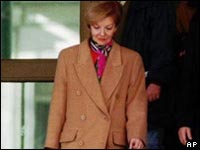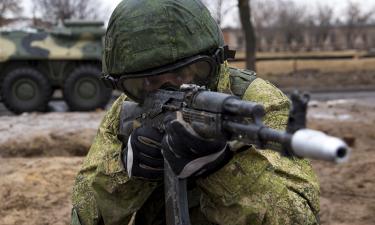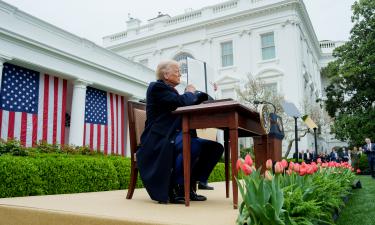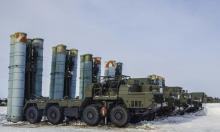Argentine judge orders arrest of former president in 1976 case
A federal judge ordered the arrest of former Argentine President Isabel Peron on Thursday for her alleged connections to a right-wing death squad that terrorized Argentines before she was ousted in a March 1976 coup.

Peron's third wife is wanted for questioning about three decrees she signed in her brief tenure calling on the armed forces to crack down on "subversive elements" during a turbulent period predating Argentina's last 1976-83 dictatorship, a judge's spokesman said.
Judge Raul Acosta also ordered her detained for questioning in connection with the disappearance of leftist Hector Aldo Fagetti Gallego in February 1976, the judge's spokesman said, speaking on condition of anonymity.
There was no immediate reaction from Peron, who ruled Argentina from July 1974 until her ouster in March 1976, and has lived in exile in Spain since 1981. But her lawyer, Atilio Neira, told Argentine radio late Thursday that he was waiting to see the final resolution of the judge's arrest order. He said he had not yet contacted Isabel Peron.
Human rights activists lauded the judge's order.
Hebe de Bonafini, an activist of the Mothers of the Plaza de Mayo, called the announcement "spectacular" and said she hoped it would bring to light a "part of our history that was dark, obscure and papered over."
Isabel Peron was sworn in as president in 1974 after the death of her powerful caudillo husband, Juan Domingo Peron, the father of Argentina's ruling political party who was elected president three times. But she struggled to hold on to power as Argentina was wracked by violence from leftist guerrillas and counterreprisals by death squads.
Kidnappings and killings of suspected leftists before the 1976 coup that toppled her presidency are considered the precursor to the "Dirty War" waged by the ensuing regime.
Although nearly 13,000 people are reported dead or missing from the 1976-83 junta era, human rights groups say the toll approaches 30,000 dissidents killed before civilian rule was restored in 1983.
Acosta, based near the western city of Mendoza, first revealed in November that he was examining the Isabel Peron era. That marked the first time that the wife of the late strongman Juan Peron has been mentioned by investigators in connection with the violence that pre-dated the junta era.
Gustavo Gioldar, who commands the federal police in the Mendoza state city of San Rafael, said last November that Acosta had begun seeking information "about the actions of security forces in the period before the military regime."
He said the judge had also ordered police at the time to determine Peron's current whereabouts as well as the locations of several former Cabinet members.
Some at the time criticized the judge, reports AP.
In November, Mendoza Gov. Julio Cobo called the probe "exaggerated" and suggested the judge was trying to blame the abuses of the military on Isabel Peron.
New human rights investigations have followed a 2005 decision by Argentina's Supreme Court in 2005 annulling a pair of 1980s amnesty laws that had sheltered scores of former police and military suspects from prosecution in cases dating to the era.
On Monday, a retired police chief suspected of being a leader of a 1970s-era death squad was put under house arrest as part of an investigation of the killings of dissidents in the run-up to the last dictatorship. Federal Judge Norberto Oyarbide confirmed he ordered Juan Ramon Morales held in connection with his probe of the Triple A squad, which human rights groups blame for at least 1,500 killings of government opponents from 1973 to 1976.
Subscribe to Pravda.Ru Telegram channel, Facebook, RSS!




